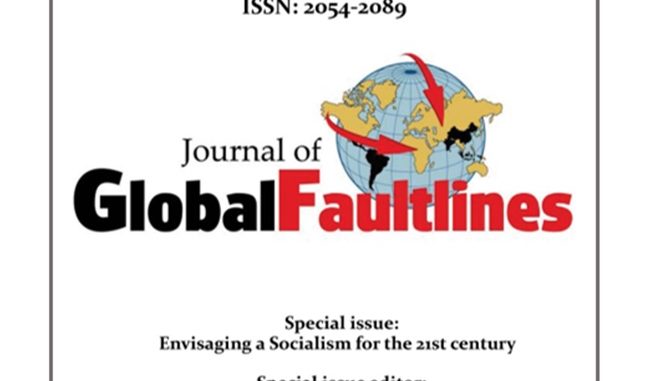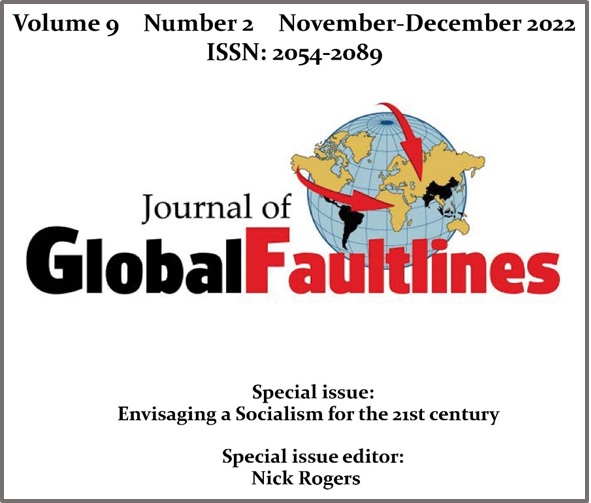
by MHI
A special issue on “envisaging a socialism for the 21st century” was published this week in the Journal of Global Faultlines. Available online, free of charge, it contains six articles, four shorter comments, two book reviews, and an introduction to the issue by Nick Rogers, its editor and one of its contributors. We are republishing Rogers’ introduction below.
Five months ago, we published one of the articles in the special issue, Andrew Kliman’s “The Critique of the Gotha Program on capitalism vs communism.” The final, official text of his article that appears in the Journal of Global Faultlines differs slightly from the version that was published here.
After situating the special issue within the current political context, Rogers’ introduction notes that it aimed to grapple with “whether socialism, as a cooperative, egalitarian, and democratic way of organizing society, remains a viable political project.” He then provides brief summaries of and commentaries on the contributions to the issue.
The articles in the special issue are: “Introduction,” by Nick Rogers; “The Critique of the Gotha Program on capitalism vs communism: An analysis and commentary,” by Andrew Kliman; “How to breathe,” by Camilla Power; “Reflections on the economics of socialism,” by Nick Rogers; “The Soviet model and the economic cold war: A vindication of the viability of socialism,” by Noah Tucker; “China as a transitional economy,” by Michael Roberts; and “Russsia’s war in Ukraine: State patriotism or economic gain?,” by Peter Lawrence.
The comments are: “Walter Rodney: Lessons for scholar-activists,” by Nicholas Mwangi; “Thinking about the crisis of the modern liberal state,” by Darrell Whitman; “Universal basic income: An idea whose time has come or just another mechanism to grease the wheels of capitalism?,” by Pamela Fitzpatrick; and “Housing in a socialist society and how do we get there?,” by Will McMahon. The book reviews are: “London Recruits,” by Luvuyo Zantsi and “Does Asia Provide a Viable Alternative?,” by Edoardo Bellando.

Special issue of the Journal of Global Faultlines—
envisaging a socialism for the 21st century
Introduction, by Nick Rogers
The collapse of the Soviet Union, according to the ideologues of the victors in the great geopolitical struggle of the second half of the 20th century, was supposed to usher in an era of stable, liberal, capitalist world order.
Stability is not the first word that springs to mind if we seek to characterize the last 30 years. Long wars in Afghanistan and Iraq, a financial and economic crash from which, 14 years on, the global economy has still not recovered, and a climate crisis, effectively ignored for many years, that may have passed the point at which it becomes a runaway catastrophe, qualify as the sort of “interesting times” one would choose not to live through.
Now, the third decade of the 21st century has seen the return of an open geopolitical contest for supremacy. The break in US-China relations that Trump instigated, but was signalled by Obama’s “pivot to Asia”, has been pursued by President Biden with barely a pause in pressing down on the accelerator. In 2022, relations between the West and Russia went from bad to a war in Ukraine that looks set to continue for months, if not years. NATO and the European Union, although their own troops are not involved, are very much actors in the conflict, supplying weaponry and financial support to Ukraine and imposing heavy sanctions on Russia, and threatening any country that chooses not to comply with boycotting Russia.
Nor is liberalism, in its political guise, faring well. The demagogic far right has held the presidency of the United States (and may hold it again), came close to retaining the presidency of the largest country in South America, Brazil, dominates the politics of India, the world’s largest “democracy”, forced through the United Kingdom’s departure from the EU, and has now seized the premiership of EU founder, Italy. It is on the rise in many other countries.
But, despite liberalism, in its economic guise, struggling to articulate solutions to global economic stagnation, now compounded by rampant inflation, capitalism is very much not under challenge. For much of the 20th century, the ideas of socialism and communism were a real force in domestic and international politics. The Cold War was couched in the language of communism versus capitalism. Today, socialist political forces do occasionally make headway, but, despite the multiple crises afflicting capitalism, they do not represent a real challenge to the political and economic establishment. That is a space the far right has filled – and one thing the far right is not is anti-capitalist.
The call for papers for this special issue of the Journal of Global Faultlines asked whether socialism, as a cooperative, egalitarian, and democratic way of organizing society, remains a viable political project. It invited contributions that illuminated socialist theory, interrogated the historical record of socialism, or drew out the significance of contemporary trends and developments, in order to make an intellectual contribution to developing a progressive alternative to the way the world is currently run.
The set of papers carried in this issue make a start on that project. Andrew Kliman undertakes a detailed analysis of Karl Marx’s Critique of the Gotha Program (1875). This “circular letter” from Marx to the leading members of the German Social Democratic Party has been the object of innumerable lazy misinterpretations that have allowed socialist thinkers to assert that “socialism” is virtually anything they say it is. Kliman’s clear and rigorous exposition cuts through a century and a half of obfuscation.
From the field of anthropology, Camilla Power analyses the “economics of time”. She reminds us that for most of our history as a species we lived in egalitarian, communist communities. Hierarchy, exploitation, and oppression are not our “natural” state. But the struggle against dominance must be won not just once, but repeatedly. Living in egalitarian communities only works when overthrowing pretensions to status, individual power or hoarding of possessions forms an integral part of the rhythm of society.
I have chosen to think about socialist economic planning and whether it is compatible with the diffusion of political power throughout society that is the only way of understanding Engels’ prediction of the “withering away” of the state. I conclude that it is, but only if we reconceptualize planning as “goal-directed economic coordination”.
Noah Tucker defends the record of central planning in the Soviet Union, looks at the reasons for the problems it experienced, and makes a case for drawing on the experience of socialists who exercised state power in the 20th century as a historical and intellectual resource for our discussions today.
The geopolitical elephant in the room when it comes to discussing socialism is tackled by Michael Roberts. China is a country ruled by a communist party that has registered enormous growth rates for 40 years and may have the potential in the decades to come to challenge the global hegemony of the United States. What is “socialism with Chinese characteristics”? Michael Roberts says that China may be on a path that is transitional to socialism, but that its society and politics will have to be transformed before socialism can be achieved.
The same question is examined by Edoardo Bellando via a review of Alberto Gabriele and Elias Jabbour’s new book Socialist Economic Development in the 21st Century.
Peter Lawrence looks at Russia’s reasons for invading Ukraine and concludes that promoting “a greater Russia as a world power to rival the US and challenge its hegemony” was at the core of Putin’s strategic reasoning.
The crisis of the modern liberal state is put under the microscope by Darrell Whitman, who asks, “How can we reconstruct power to serve people and not oligarchs and bureaucrats?”
Forty-two years after the assassination of Walter Rodney, Nicholas Mwangi draws our attention to his life. Rodney demonstrated a brave commitment to combining scholarship with political activism in a way that too few academics and intellectuals are prepared to contemplate today. However, Kenya is home to a number of “revolutionary intellectuals” of a similar caliber, in terms of courage, to Rodney. Mwangi highlights the dedication of Professor Maina wa Kinyatti, who suffered imprisonment and torture without surrendering to the demands of the regime.
The focus moves to South Africa as Luvuyo Zantsi recalls the struggle against apartheid, reviewing Ken Keable’s London Recruits: The secret war against apartheid. White activists from Britain (often members of the Communist Party of Great Britain) and the Netherlands volunteered, at great personal risk, to carry through missions in apartheid South Africa to distribute propaganda materials (often dispersed by small explosions) and pursue other activities on behalf of the liberation movements.
Finally, case studies by Pamela Fitzpatrick and Will McMahon examine, respectively, the social security system in the UK, and housing policy in the UK. Fitzpatrick assesses the merits of a universal basic income, supported by, for very different reasons, some on the left and the right of the political spectrum. She is sceptical about whether it can provide an answer to poverty and precarity in the UK. McMahon thinks through the implications for a future socialist government in Britain of trying to solve the housing crisis, while constructing a political coalition that encompasses homeowners and renters.


Be the first to comment